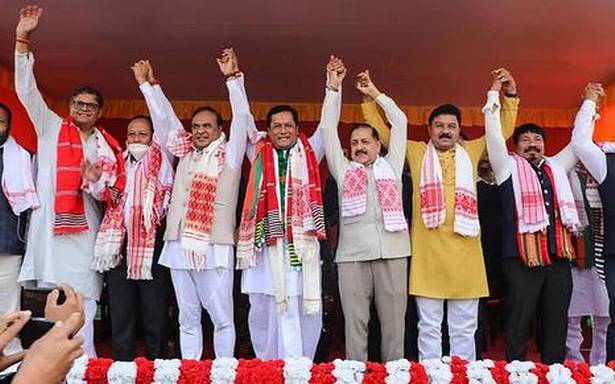Two opposition alliances are like a double-edged sword for BJP and its allies
Assam’s mandate 2021 is likely to go into the record books as the first among three blocs rather the major parties that lead them. For the bloc headed by the ruling Bharatiya Janata Party, the other two are like a double-edged sword.
The BJP heads for the polls with a fairly clean image, particularly of Chief Minister Sarbananda Sonowal, and a large portion of its Hindu votes intact. Its grassroots connect and pampering of tea plantation workers — a major voting force in 45 of the State’s 126 Assembly seats — are its strength despite the lack of a ‘Modi wave’ as in 2016.
But its weakness has been the lack of inclusive politics and alienation of Muslims who form 34% of the State’s population. Finance Minister Himanta Biswa Sarma, the BJP’s main poll strategist, has claimed that the party can do without Muslim votes.
This could help the party in Assamese-majority areas where sentiments against the All India United Democratic Front (AIUDF) headed by perfume baron Badruddin Ajmal run high. The Congress has some hold in these areas, but its alliance with the AIUDF — seen as catering to migrant Muslims — could be an advantage for the BJP.
May play spoilsport
The threat in these areas is perceived to be from the new regional parties, the Assam Jatiya Parishad (AJP) and jailed activist Akhil Gogoi’s Raijor Dal, brings to the table. These two parties are not expected to make a splash, but may play spoilsport by causing a split of the BJP votes.
While the BJP claims the incompatibility of the constituents of the two opposition alliances and their overestimation of sentiments against the Citizenship (Amendment) Act will work to its advantage, political scientist Akhil Ranjan Dutta of Gauhati University said the Congress-AIUDF could damage the saffron party if the voting trend is similar to that of 2016. The Congress-AIUDF had a combined vote share of 44% in the last election.
The BJP’s worries are also its allies — the Asom Gana Parishad (AGP) and the United People’s Party Liberal (UPPL), the latter specific to the Bodoland Territorial Council (BTC)
This is because the AJP, born from the same seeds of regionalism as the AGP, is expected to dent the AGP more than the BJP. The UPPL, on the other hand, could not stop the Bodoland People’s Front (BPF) — the BJP’s former ally now with the Congress-led Mahajot or grand alliance — from becoming the single largest party in the BTC polls in December 2020.
The Congress is believed to enjoy an edge in the BTC areas. It could also cash in on the State’s demography, especially the BJP’s anti-Muslim stance and unhappiness among a section of some 50 lakh Bengali Hindus, who feel the CAA has done more harm than good to the community in Assam.
Weak spots
Factionalism and too many power centres after the death of former Chief Minister Tarun Gogoi are the weak spots of the Congress, as is the perceived negative impact of its association with the AIUDF in areas inhabited by the indigenous communities. The alliance, on the other hand, could help it gain in Muslim areas where the AIUDF has been holding sway since the 2006 polls.
The Congress could also gain from the expected damage the AJP-Raijor Dal combine could inflict on both the BJP and the AGP. The AJP-Raijor Dal aims to be the “more committed” regional alternative to the AGP.
The threats for the Congress would be the possible shifting of minority votes to the AJP-Raijor Dal, which has been working in minority areas to appeal to “Muslims who identify with Assamese sentiments rather than Ajmal.” There is also the likelihood of the “tea tribes” voters to return from the BJP fold despite promises of higher wages and facilities.
The AGP’s strength is its brand of regionalism born of the six-year Assam Agitation to drive out illegal migrants. But the party’s USP is being challenged by AJP-Raijor Dal and it has long been riddled with factionalism with no young and vibrant leaders emerging.
The only minority-based party in Assam, the AIUDF’s strength is its appeal in several districts where migrant Muslims dominate. But it has virtually become a one-man party, dependent on its chief Badruddin Ajmal.
While the alliance with the Congress has given it an opportunity to expand base and be in the government, it faces the threat of Muslims shifting loyalty to the AJP and Raijor Dal.
The AJP-Raijor Dal has the X-factor going for it, but its refusal to align with the Congress and marking of the AIUDF as a communal party could rob it of an opportunity to make inroads as part of a greater anti-BJP opposition.
Source: Read Full Article

